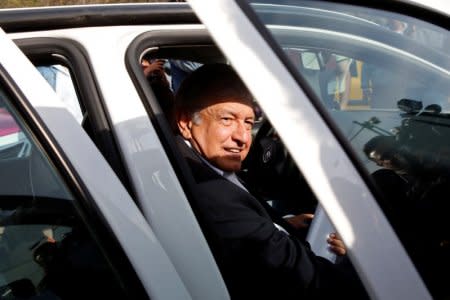Mexican leftist's 'big tent' pitch puts presidency in sight

Thomson Reuters
By Dave Graham
MEXICO CITY (Reuters) - After years of denouncing his political opponents in Mexico as stooges of a corrupt "mafia," leftist leader Andres Manuel Lopez Obrador has extended his hand to them in a bid to make it third time lucky in the July 1 presidential election.
So far, it's working.
In a few months, he has assembled a coalition stretching from socially conservative Christian evangelicals to admirers of socialist Venezuela and business tycoons, each with contrasting visions for Mexico.
Dozens of lawmakers from across the political spectrum have switched sides to join Lopez Obrador's National Regeneration Movement (MORENA), a party that is not yet four years old.
From the ruling Institutional Revolutionary Party (PRI) in the center, the National Action Party (PAN) on the right and the Party of the Democratic Revolution (PRD) and Citizens' Movement on the left, defectors are steadily broadening MORENA's base.
The shift has added to a sense that history may be on MORENA's side in 2018, and has raised some hopes that Lopez Obrador, a perennial bugbear of the Mexican establishment, may be preparing to adopt a more consensual approach to governing.
"The doors of this movement are open to people from the PRI, the PAN, the Citizens Movement, who are already choosing to join this struggle," Lopez Obrador told thousands of supporters in a speech in the central city of Guadalajara last month.
"All parties are welcome," the 64-year-old former mayor of Mexico City said. "It's happening as a natural process."
The words are a pivot from his longstanding refrain that the main parties belong to the "mafia of power" - Lopez Obrador's shorthand for corrupt political and business interests that thrive while much of the country is stuck in poverty.
After Enrique Pena Nieto won Mexico's presidency in 2012, he quickly brokered a loose alliance between the PRI, PAN and PRD so he could pass legislation in Congress, where no party has held an outright majority for more than two decades.
Lopez Obrador seized on the alliance, known as the Pact for Mexico, as evidence the main parties were in cahoots, helping to polarize the political landscape.
As the election nears, however, Lopez Obrador is seeking to bring those same political forces into his own orbit.
The ideological diversity of his alliance could breed future tensions. For now though, discontent over corruption, rising violence and tepid economic growth have shattered confidence in the PRI.
The electoral hopes of the PAN and the PRD, meanwhile, have been undermined by years of infighting.
Unsure if they could win alone, the PAN and PRD opted to run on a joint ticket, upping the competition for safe seats on electoral lists, and making politicians who feel squeezed out natural new recruits for Lopez Obrador's young party.
"The traditional parties in Mexico have become fiefdoms of the few, and have moved away from the people," said Senator Gabriela Cuevas, who left the PAN to join Lopez Obrador in January.
"The movement (Lopez Obrador) heads is about inclusion, and it takes a pluralist view of Mexico," she added.
Nevertheless, his populist instincts and the personalized flavor of his movement unsettle critics, who fear Lopez Obrador will seek to impose a presidential system of rule in a country where one size increasingly does not fit all.
MOMENTUM
Recent polls give the silver-haired Lopez Obrador a lead of more than 13 percentage points over his closest rival, Ricardo Anaya, who heads the PAN-PRD alliance. He holds an even bigger advantage over the PRI contender, Jose Antonio Meade.
Making matters worse for the PRI, January data from polling firm Buendia & Laredo showed that Anaya supporters are almost twice as likely to favor Lopez Obrador over Meade as a second choice.
Lopez Obrador had a similar lead in March 2006. But his spiky, abrasive response to efforts to paint him as an economic liability sapped his momentum and he lost narrowly to Felipe Calderon, the PAN candidate. He then staged massive protests, claiming he had been robbed.
The protests angered many Mexicans and Lopez Obrador was well off the early pace in 2012. But he finished the campaign strongly to place second again behind Pena Nieto of the PRI.
Lopez Obrador's adversaries hoped he would again slip up in 2018. So far, he has fared better, laughing off criticism and minding his words, said Hector Larios, a senior PAN senator.
At the same time, the PAN and the PRI have attacked each other relentlessly with accusations of corruption, allowing Lopez Obrador to float blithely above the fray.
Via its ally, the Labor Party, Lopez Obrador's MORENA now forms the third biggest group in the Senate as a result of more than a dozen walk-outs from the PRD, PAN and PRI.
In the lower house, MORENA has absorbed 15 deputies from other parties. Reports of new defections to Lopez Obrador's side at state, local or federal level trickle in almost daily.
"He's generating this attraction because he's got a momentum that makes him look like a winner," said Larios.
Still, many influential entrepreneurs remain wary of Lopez Obrador, and the powerful CCE business lobby has rebuked him for threatening to unpick parts of Pena Nieto's economic agenda.
Businesses are especially worried by Lopez Obrador's pledges to halt auctions of new oil and gas contracts and to scrap the government's plan for a new Mexico City airport.
To allay those concerns, senior advisers, such as MORENA president Yeidckol Polevnsky, have promised to foster continuity within the government bureaucracy.
"If we intend to govern for everyone, obviously we have space for everybody," she told Reuters.
(Editing by Frank Jack Daniel, Dan Flynn and Steve Orlofsky)
See Also:

 Yahoo News
Yahoo News 
